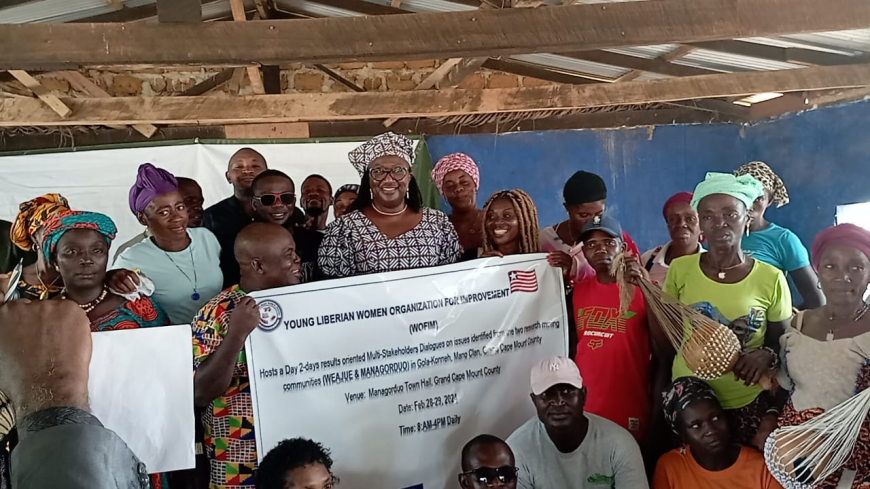As a means of understanding the nitty-gritty of the continuing rifts between Bea Mountain Mining Company (BMMC) and citizens of affected communities in Grand Cape Mount County, the GIZ supported Young Liberian Women Organization for Improvement (WOFIM) has released its findings.
WOFIM is a local mineral civil society organization working in the environmental and mineral sectors of Liberia.
Over the last few months, the organization with support from the German Development Cooperation (GIZ), visited two of the three affected communities, and released its findings before organizing a grievance and committee with the mandate to settle disputes between the company and the affected mining communities.
The WOFIM organized dialogue was attended by members of the various communities as well as Grand Cape Mount County Senator Darbah Varpilah, but the company failed to send a representative despite being written.
Speaking at the meeting, Senator Varpilah expressed regret of the massive destruction of lives and properties due to disagreements between citizens and the company.
As a result of this, the Grand Cape Mount Senator promised to work with her colleagues at the Liberian Senate to ensure that key mining laws are revisited so that there is a clear understanding between the people and whatever company.
Speaking to reporters, the Executive Director of WOFIM Madam Kona S. Kollie hailed the Grand Cape Mount County Senator and residents who attended the occasion.
But the WOFIM Executive frowned on the company’s failure to attend the dialogue that had the sole purpose of initiating a peaceful atmosphere within its concession areas.
“We are frustrated by the failure of the company to attend, especially without citing any reason or excuse. For us, our role was to ensure that peace prevails. We are not for the people neither for the company, but to bring them together for continue peace,” asserted Kona.
Meanwhile, the data of the findings reveals a clear dominance of female respondents, comprising 64.2% of the total respondents and male respondents with 35.8%.
The WOFIM’s findings indicate that environmental pollution emerges as the most significant concern, with a substantial majority of respondents (78.0%) citing it as a source of conflict or complaint. The Findings state that this high percentage underscores the significant impact of mining activities on the local environment, including issues such as air, water, and soil pollution.
It states that a significant proportion of respondents (36.5%) express concerns about the effects of blasting activities associated with mining operations. A smaller but notable percentage of respondents (5.7%) report conflicts or complaints related to land issues stemming from mining activities.
The WOFIM research furthered that a very small fraction of respondents (0.6%) mention unpaid compensation for crops as a source of conflict or complaint. Minimal percentage of respondents (0.6%) raise concerns about sexual exploitation linked to mining operations.
The overwhelming majority of respondents (93.7%) indicate that there have been no solutions to the conflicts or complaints raised by the community regarding mining activities. This suggests a significant gap between the grievances expressed by the community and the effectiveness of measures taken to address them.
Furthermore, the findings assert that a significant majority of respondents (68.6%) report that they are not aware of any grievance mechanisms in place to solve problems with mining companies. This suggests a lack of communication or transparency regarding the availability or functioning of such mechanisms within the community. Only a minority of respondents (31.4%) indicate awareness of grievance mechanisms for addressing issues with mining companies.
“The majority of respondents (82.0%) attribute the creation of grievance mechanisms to community members themselves. Nearly half of the respondents (48.0%) identify elders as instrumental in creating grievance mechanisms. Elders often hold significant influence and authority within traditional or local governance structures, making their involvement crucial in decision-making processes related to community welfare and conflict resolution. A small percentage of respondents (4.0%) provide specific details about other stakeholders involved in creating grievance mechanisms. A small proportion of respondents (4.0%) indicate uncertainty or lack of knowledge about the parties responsible for creating grievance mechanisms,” said the report.
“A minimal percentage of respondents attribute the creation of grievance mechanisms to non-governmental organizations (NGOs) or community-based organizations (CBOs) (2.0%) and government agencies (2.0%). Interestingly, none of the respondents attribute the creation of grievance mechanisms to the mining company itself. This absence may reflect a perception that mining companies have not been proactive in establishing mechanisms or engaging with communities to address grievances effectively.”
Among other things, the findings add that a majority of respondents (57.2%) indicate the existence of structures at the community level to solve conflicts. A notable proportion of respondents (40.3%) report the absence of structures at the community level for conflict resolution. A small percentage of respondents (2.5%) express uncertainty or lack of knowledge about the existence of community structures for conflict resolution.
Accordingly, nearly half of the respondents (49.7%) are involved in some form of business ownership or entrepreneurship with (17.6%) identified as farmers, highlighting the importance of agriculture as a livelihood. (12.6%) are engaged in the mining sector. A considerable proportion (11.9%) report has no occupation. A small percentage of respondents (6.3%) fall into the category of "Others". A smaller fraction of respondents are involved in occupations such as planting (1.3%) and fishery (0.6%), representing sectors related to agriculture or marine activities.








































































